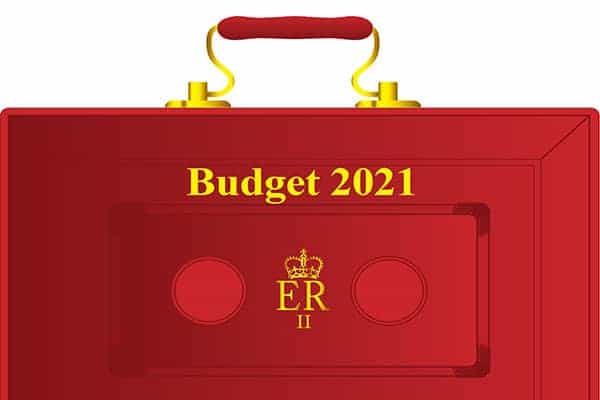
How does the 2021 Budget affect freelancers, contractors and small businesses?
Posted on 5th March 2021 by Phil Ainley
As we reach the 12-month milestone for the Coronavirus pandemic and the lockdown disruption it has caused to the economy and our social lives, today’s 50-minute Budget announcement is that there will be more help for the self-employed, including grants for an estimated 600,000 people, should be welcomed, even if many feel the improved help has come a little too late.
To date, what help has there been for the self-employed?
The Chancellor’s first package of measures to help the self-employed were announced in March 2020.
If a self-employed person, or those in partnerships, suffered a loss in income they were paid up to 80% of their profits, up to a total of £2,500 per month.
This package was available to those who had been trading for the 2018-2019 financial year and planned to continue trading but had been negatively impacted by the Coronavirus. Sadly, those who had only just made the leap into self-employment were not eligible.
The package was initially provided as a lump sum to cover three months, with a second and final payment, of 70% of profits up to £2,190 for three months, being announced in the summer of 2020. This proved not to be the final payment, but the second of four payments as the effects of the pandemic worsened.
Businesses have also been able to apply for government backed support loans, but loans mean increased debts which many self-employed business owners simply cannot afford to take on for fear that their businesses will not recovery once lockdown restrictions are lifted.
Newly self-employed now eligible to claim cash grants
Support for the self-employed will continue until September 2021, including an improvement for access to the self-employed grant scheme.
People who previously were ineligible for a grant will now be able to claim grants four and five, provided they filed a tax return by Midnight on 2nd March, 2021.
Grants four will cover the three months from February to April 2021 and will cover 80% of trading profits1. There will be a fifth grant from May to September 2021 with the system open to applications from late July.
As the economy opens in the summer, people whose turnover has fallen by 30% or more will continue to receive the full 80% grant while those whose turnover has fallen by less than 30% will receive a grant of 30%1.
The grants will be available to a further 600,000 newly self-employed people1, but as pointed out on Politics Live, the Institute of Fiscal Studies says there are 2.5 million people excluded from the scheme and at least 1.5 million of those could easily be included. So it isn’t good news for everyone.
The Chancellor added the government will have spent £33bn supporting the self-employed during the crisis.
Will freelancers and contractors have to pay more tax?
There was no mention of increased taxes for the self-employed in the Budget, nor was there any further news regarding IR35.
However, it was recently rumoured that the Chancellor could potentially be looking to increase the treasury’s coffers via the creation of a new tax band for owner/managed limited companies with ‘one clear client’. On the face of it, this looks like an addition to private sector IR35 as a potential catch-all to ensure those PSC’s who work for one client, but have been determined as outside IR35, still pay more tax.
Many self-employed workers are still expressing concerns that businesses are finding the changes too complicated and as a result the contractors themselves will be the ones to suffer through increased tax bills and potential fines relevant to previous contractual engagements.
But with a potential £1.3bn of extra tax revenue on offer by 2023/24, it looks unlikely that a further delay to IR35 will be announced.
What was announced was £100million for a new HMRC taskforce to tackle furlough fraud and tax evasion. No doubt IR35 tax will be included somewhere in the new taskforce’s brief.
Sole traders are freelance professionals who run their own business as an individual and are personally responsible for the losses their business makes. Because they do not operate through a limited company structure, they are unaffected by the upcoming private sector IR35 reforms, as sole traders are exempt.
The bigger picture
In IPSE’s last quarterly Freelancer 2020 Q4 Confidence Index2, they saw the low freelance business confidence based on key factors including the state of the UK economy, the negative effect of Coronavirus and on taxation, especially with private sector IR35 just around the corner.
To compound this, the study found that many freelancers expect to have to lower their day rates in the coming year to secure client work. So, even though there have been plus points in the Budget and in the Coronavirus measures in general, it is likely that there has not been enough offered in the Budget to make much of a difference.
However, what the freelancers need to ensure there are work opportunities is a strong economy, which means helping to get businesses back on track to full recovery, so the work opportunities are created, and this Budget appears to be addressing many of the needs of businesses.
Tax stability
The National Insurance and VAT thresholds are being frozen this year,
On income tax, the threshold for paying the basic rate will rise to £12,570, and for higher-rate payers the threshold will rise to £50,570 from April 2021. However, these threshold freezes will still help to increase the amount of income tax revenues for the treasury (up to £8bn), with approximately one million more people set to pay more income tax by 20263, partly due to pay rises pushing middle to high earners above the thresholds.
Corporation tax remained at 19% for companies recording profits of under £50,000, while corporation tax will rise to 25% for businesses recording profits over £250,0004, from 2023.
The Chancellor confirmed that the business rates holiday would be extended through to the end of June. “For the remaining nine months of the year, business rates will still be discounted by two-thirds, up to a value of £2m for closed businesses, with a lower cap for those who have been able to stay open,” he says.
The VAT threshold will remain at £85,000 until 2024.
On VAT he also confirmed the 5% reduced rate of VAT will be extended for six months to 30th September, 2021 followed by an interim rate of 12.5% for the next six months. The standard rate of VAT will not return until April 2022.
What is the ‘super deduction’?
The Chancellor also announced a ‘super deduction’, which is a new increased temporary tax relief for companies who invest in certain qualifying assets from 1st April, 2021. The incentive is expected to stimulate up to £25bn of investment in the UK5.
The measure will allow a temporary first year allowance including a super-deduction of 130% on most new plant and machinery investments which usually only qualify for 18% relief, and a 50% allowance on new plant and machinery investments that ordinarily qualify for only 6% relief.
As an example, according to PwC, a manufacturer incurring £10m of expenditure on new factory could receive and additional £1m of cash tax saving over the two years the measure is in place5.
Growth forecasts
The Chancellor stated the UK’s rapid Covid-19 vaccine roll-out will help enable a “swifter and more sustained” economic recovery, however he did add that repairing the long-term damage to the economy “will take time”.
Official forecasts by the Office for Budget Responsibility (OBR) predict quicker growth than expected, with 4% growth in 2021, enabling the economy to get back to pre-Covid levels six months earlier than previously thought.
Growth is expected to strengthen further in 2022 through growth of 7.3% before dropping to more realistic growth levels of 1.7% in 2023, 1.6% in 2024, and 1.7% in 2025.
How does the Budget benefit those in Wales, Scotland, and Northern Ireland?
Through the Barnett formula, the Chancellor says he is increasing funding for the devolved administrations by £1.2bn for the Scottish government; £ £740million for the Welsh government; and £410million for the Northern Ireland executive.
How did industry react to the Budget?
The CBI (Confederation of Business Industry) has welcomed many of the Chancellor’ announcements, especially the super-deduction, but took a very different view of the rise in Corporation Tax saying it “sends a worrying signal to those planning to invest in the UK”.
APSCO (Association of Professional Staffing Companies) welcomed extension of the furlough scheme and the announcement of a new recovery loan scheme to replace the Bounce Back support, but they also expressed concerns over the impact that IR35 will have on the recruitment industry from 6th April, 2021.
In conclusion
For all the hype surrounding this much anticipated Budget, it came across as remarkably business-like. After most of the major announcements were trailed in advance, in the end there were very few surprises.
The challenge for the Chancellor now will be ensuring his policies meet the challenge of the recovery of the UK’s economy and social structure.
The leader of the opposition, Sir Kier Starmer, labelled it a Budget that “papers over the cracks” rather than rebuilding the foundations for the future, adding that there were “very few silver linings”.
One thing that stands out is that the government borrowing will remain high to throughout 2021 to help provide the aide the economy needs to recover over the next two years, but do the measures announced really do enough to help small businesses who are struggling right now?
We will be keeping you up to date on the Budget and other matters affecting the self-employed economy on our website blog. Watch this space.
Sources:
- www.bbc.co.uk/news/business-52052123
- https://www.ipse.co.uk/resource/freelancer-confidence-index-q4-2020.html
- www.bbc.co.uk/news/business-56270941
- www.bbc.co.uk/news/uk-politics-56266773
- www.pwc.co.uk/press-room/press-releases/Budget-2021-PwC-comments-on-super-deductions.html
Related Articles:
What can we expect in the March Budget?




